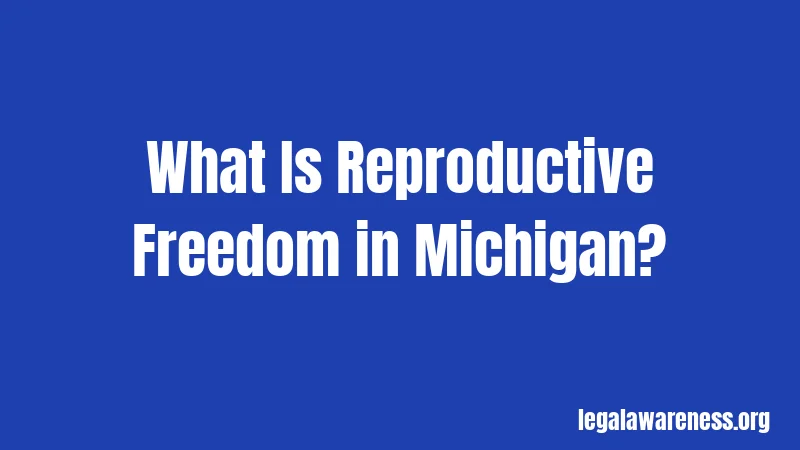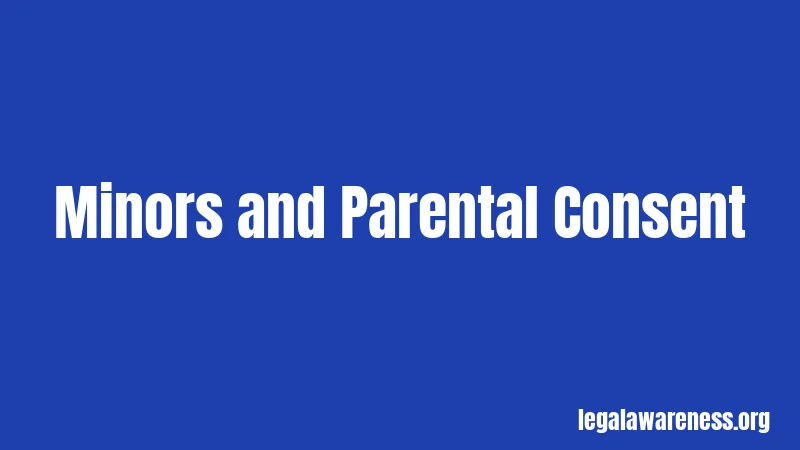Abortion Laws in Michigan (2026): Your Rights After Prop 3
Most people don’t realize how much Michigan’s abortion laws have changed in just a few years. Seriously. The state went from having a 1931 ban on the books to becoming one of the most abortion-protective states in the country.
If you’re here looking for answers, you’re in the right place. Let’s break down exactly what Michigan law says about abortion and what it means for you.
What Is Reproductive Freedom in Michigan?

Here’s the deal. In November 2022, Michigan voters approved Proposal 3 with 57 percent of the vote. This added the right to abortion and contraceptive use to the Michigan Constitution.
That’s a big deal. It means abortion rights are now protected at the state constitutional level. No ordinary law can take that away without another vote of the people.
Under the Michigan Constitution, every individual has a fundamental right to reproductive freedom. This includes the right to make decisions about all matters relating to pregnancy. That covers prenatal care, childbirth, postpartum care, contraception, sterilization, abortion care, miscarriage management, and infertility care.
Wondering what “reproductive freedom” actually means in practice? It means the government can’t interfere with your pregnancy decisions unless it has a really good reason. And even then, any restrictions have to be the least burdensome option possible.
When Is Abortion Legal in Michigan?
Abortion in Michigan is legal throughout pregnancy. That might surprise you. But there’s some nuance here.
Abortion is legal in Michigan through fetal viability. After that point, the state may regulate abortion. However, it remains legal when necessary to preserve the life or health of the pregnant individual.
So what does “fetal viability” mean? Fetal viability is the point in pregnancy when, in the professional judgment of an attending health care professional, there is a significant likelihood of the fetus’s sustained survival outside the uterus without extraordinary medical measures.
That’s typically somewhere between 24 and 28 weeks, though it depends on the individual circumstances. Your doctor makes that call, not politicians.
Pretty straightforward, right?
What Restrictions Have Been Removed?

Michigan has been busy removing old abortion restrictions. This is where it gets interesting.
The 24-Hour Waiting Period
Michigan’s mandatory 24-hour waiting period for receiving abortions has been struck down. A Michigan Court of Claims judge determined that the rule was unconstitutional. This happened in May 2025.
Before this ruling, patients had to wait a full day after receiving state-mandated information before getting an abortion. Michigan’s 24-hour waiting period is no longer in effect as of June 25, 2024. You are not required to review information from the state and sign a form stating that you have done so.
This is huge. That waiting period was causing about 150 patients per month to cancel appointments because of scheduling conflicts with work or transportation issues.
The Physician-Only Requirement
The court also struck down a rule that had barred nurse practitioners, certified nurse midwives, and physician assistants from performing abortions.
Now more types of healthcare providers can offer abortion care. This helps expand access, especially in parts of Michigan where there aren’t many doctors.
Informed Consent Requirements
The court also struck down requirements surrounding mandatory counseling that required abortion providers to provide an image of a fetus to patients receiving abortions.
However, pause here. The court upheld a rule that requires abortion providers to screen for signs of coercion, saying the rule does not violate the constitutional right to reproductive health care.
The Old 1931 Ban
Although Michigan had a pre-Roe law on the books enacted in 1931 that banned virtually all abortions, a court had blocked enforcement of that law. The state legislature later repealed the 1931 abortion ban.
That old law is gone for good.
The Reproductive Health Act
In 2023, Governor Gretchen Whitmer signed the Reproductive Health Act into law. This package of bills made several important changes.
The RHA removes barriers to health care, lowers costs for independent providers, and protects access to abortion.
Here’s what it did:
It repeals the law that forced patients to buy a separate insurance rider for abortion. Effectively, the law forced people to pay more out of pocket just in case they were assaulted.
Before this change, people had to purchase special insurance coverage for abortion separately from their regular health insurance. Critics called it “rape insurance” because it made people pay extra in case they needed an abortion after an assault.
The Reproductive Health Act also removed criminal penalties for healthcare providers and got rid of strict clinic regulations that were making it harder for abortion providers to operate.
Minors and Parental Consent

Okay, this part is important if you’re under 18.
Under Michigan law, anyone under the age of 18 must have the consent of a parent or legal guardian, or permission from a judge, to have an abortion.
About 700 young people, mostly ages 16 and 17, have abortions in Michigan each year. More than 85 percent involve a parent in their abortion decision.
But what if you can’t or don’t want to tell your parents?
The Judicial Bypass Option
Alternatively, teens can seek a waiver from a judge. The judge can grant permission for an abortion if they determine the minor is sufficiently mature and well-enough informed to make the decision independently. Or the judge may grant the waiver if it would be in the best interests of the minor.
Each year about 100 young people seek a judicial waiver to bypass Michigan’s parental consent law.
The process works like this. You petition the probate court for a waiver. A judge reviews your case. If they determine you’re mature enough to make the decision or that involving your parents wouldn’t be in your best interest, they grant the waiver.
If you are a minor with a judicial bypass, you will need all paperwork provided by the judge and a picture ID if you have one. A school ID is acceptable.
When a young person does not involve a parent, it is often rooted in concern for their safety and well-being.
If you need help with judicial bypass, organizations like Planned Parenthood of Michigan can provide guidance.
Types of Abortion Available
Michigan offers both medication abortion and in-clinic procedures.
Medication Abortion (The Abortion Pill)
Planned Parenthood of Michigan provides medication abortion up to 12 weeks of pregnancy for in-person visits and up to 11 weeks 5 days of pregnancy for telehealth visits.
Medication abortion, also called the abortion pill, involves taking two medications, mifepristone and misoprostol, up to 48 hours apart. Both medications must be taken while you are in the state of Michigan.
The abortion pill is a safe and effective option. It’s been used in the United States for over 20 years.
In-Clinic Abortion
In-clinic abortion procedures are offered through 19.6 weeks of pregnancy. This is an in-office, out-patient procedure. Some providers also offer sedation if desired.
Some clinics offer procedures up to 24 weeks.
Telehealth Abortion
Here’s something that might help. A virtual visit for the abortion pill is a safe, convenient, and private option to get an abortion in Michigan. With a virtual visit, you get the same high-quality, professional care and the same medication you would get in-person. The only difference is the virtual visit and pills coming by mail.
People 18 and older can schedule an appointment with the Virtual Health Center to get the abortion pill via telehealth. If you are under 18, you’ll need to call to discuss your options.
Telehealth has made abortion more accessible for people who live far from clinics or have trouble taking time off work.
Costs and Insurance Coverage
Let’s talk money. This is where things can get complicated.
The typical cost of abortions in the state ranges widely, from $500 to $700 for a medication abortion to well over $1,000 for a surgical abortion.
At carafem, clients pay between $0 and $399 based on eligibility for financial aid. Most clients pay $225 or less.
Insurance Coverage
According to state data, nearly 97% of the more than 27,000 Michigan residents who had an abortion last year paid out of pocket. Less than 3% used insurance to cover the cost.
Why so few using insurance? Because Michigan still has restrictions on insurance coverage for abortion.
The Reproductive Health Act did repeal the requirement to buy a separate insurance rider. But insurance companies aren’t required to cover abortion, and many don’t.
Medicaid Coverage
Medicaid does not cover abortions in Michigan.
There has been a state ban on Medicaid coverage of abortions since 1987. In a 1988 referendum, voters opted to keep the ban.
This means if you have Medicaid, you’ll need to pay out of pocket for abortion care. That’s a significant barrier for many people.
Financial Assistance
If you’re worried about cost, don’t lose hope. Planned Parenthood of Michigan has a team of abortion navigators who can help you plan for your visit. They can help in accessing financial assistance and coordinate travel to obtain safe and legal abortion care.
Various abortion funds also help cover costs for people who can’t afford care.
Where to Get an Abortion in Michigan
There are currently 22 abortion clinics in Michigan offering in-person services.
Major providers include:
Planned Parenthood provides in-clinic abortion procedures at their Power Family center in Ann Arbor, Irwin/Martin in Grand Rapids, and health centers in Flint and Kalamazoo. Other health centers offer the abortion pill but not surgical procedures.
Northland Family Planning has served as the leading abortion care clinic to Detroit and its surrounding communities for almost 50 years. They have locations in Southfield, Sterling Heights, and Westland.
The University of Michigan Health system also provides abortion care, particularly for patients with complex medical situations or pregnancy complications.
Most clinics are concentrated in southeast Michigan and urban areas. If you live in northern Michigan or the Upper Peninsula, you may need to travel for care.
Protections for Patients and Providers
Michigan has some protections in place, though they’re not as strong as some other states.
The state shall not penalize, prosecute, or otherwise take adverse action against an individual based on their actual, potential, perceived, or alleged pregnancy outcomes. This includes miscarriage, stillbirth, or abortion. The state also cannot penalize someone for aiding or assisting a pregnant individual in exercising their right to reproductive freedom with their voluntary consent.
That’s directly from the Michigan Constitution now.
Protections for Out-of-State Patients
Governor Gretchen Whitmer issued executive orders in 2022 that bar Michigan agencies from cooperating with out-of-state investigations into abortion providers and patients. The orders also prevent her office from complying with extradition requests related to reproductive health care.
However, Michigan does not have a shield law. Providers are only protected by an executive order from the governor that can be revoked, suspended, or expire.
Whitmer’s second and final term ends in 2027. If a Republican wins the state’s governorship in 2026, they could cancel the order.
This is something to keep in mind. The protections for out-of-state patients depend on who’s in the governor’s office.
What Can’t You Do?
Even with strong protections, there are still some limitations.
You cannot use state Medicaid to pay for an abortion except in cases of rape, incest, or life endangerment.
Minors still need parental consent or a judicial bypass.
After fetal viability, abortion is only available to protect the life or health of the pregnant person.
How to Access Abortion Care
Ready to schedule an appointment? Here’s what you need to know.
If you are 18 years or older, bring a picture ID that clearly states your date of birth. Providers will not be able to provide services without it.
If you are a minor with parental consent, you will need a copy of your birth certificate, your parent’s picture ID, and your picture ID if you have one.
Planned Parenthood of Michigan accepts many insurance plans, including Michigan Medicaid for non-abortion services.
Most clinics accept cash, credit cards, and money orders. Payment is typically expected at the time of service.
Frequently Asked Questions
Is abortion legal in Michigan? Yes. Abortion in Michigan is legal throughout pregnancy. After fetal viability, it remains legal when necessary to protect the life or health of the pregnant person.
How late can you get an abortion in Michigan? There’s no specific week limit before viability. Michigan abortion clinics may set their own limits, such as through 20 to 24 weeks of gestation. After viability, abortion is available only to protect the pregnant person’s health.
Do I need parental consent if I’m under 18? Under Michigan law, anyone under the age of 18 must have the consent of a parent or legal guardian, or permission from a judge, to have an abortion.
Does Michigan Medicaid cover abortion? Medicaid does not cover abortions in Michigan except in cases of rape, incest, or life endangerment.
Is the 24-hour waiting period still in effect? Michigan’s 24-hour waiting period is no longer in effect as of June 25, 2024.
Final Thoughts
Michigan has come a long way in protecting abortion rights. Prop 3 enshrined reproductive freedom in the state constitution. The Reproductive Health Act removed many outdated restrictions. And recent court decisions struck down the 24-hour waiting period and other barriers.
But challenges remain. Medicaid still doesn’t cover abortion. Minors still need parental consent. And protections for out-of-state patients rely on executive orders that could change with the next governor.
If you need abortion care, know that it’s legal and available in Michigan. Financial help exists for those who need it. And healthcare providers are ready to support you.
Now you know the basics. Stay informed, and when in doubt, reach out to a healthcare provider or legal advocate who can help.
References
- Michigan Constitution Article I, Section 28: https://www.legislature.mi.gov/Laws/MCL?objectName=mcl-Article-I-28
- Center for Reproductive Rights – Michigan: https://reproductiverights.org/maps/state/michigan/
- Planned Parenthood of Michigan: https://www.plannedparenthood.org/planned-parenthood-michigan/healthcare/abortion-services
- Michigan Court of Claims ruling on 24-hour waiting period, May 2025: https://michiganadvance.com/2025/05/14/court-strikes-down-michigans-24-hour-waiting-period-for-abortions/
- Governor Whitmer signs Reproductive Health Act: https://www.michigan.gov/whitmer/news/press-releases/2023/11/21/governor-whitmer-signs-reproductive-health-act
